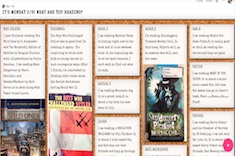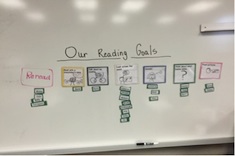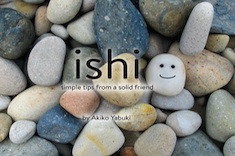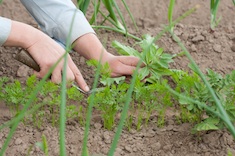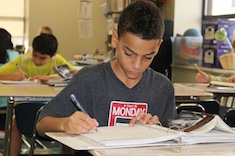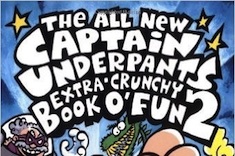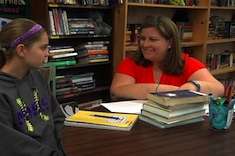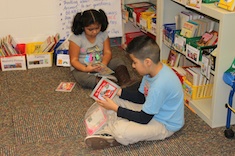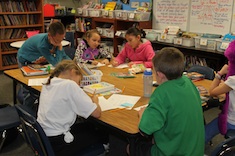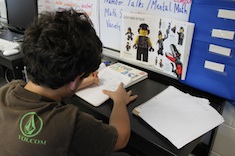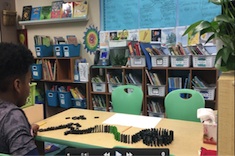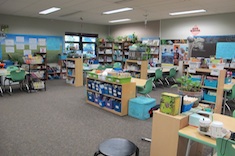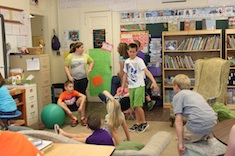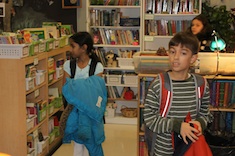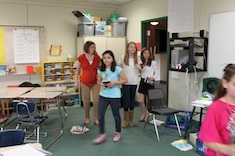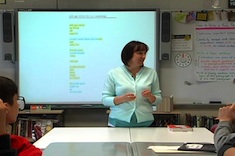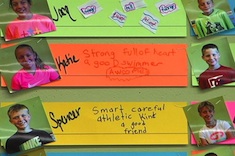Library
Choice Literacy Articles & Videos
The Choice Literacy library contains over 3,000 articles and 900 videos from 150+ contributors. Classic Classroom and Literacy Leadership subscribers have access to the entire library. Content is updated continuously, with five to six new features published each week.
Latest Content
Padlet Possibilities
Katherine Sokolowski finds that electronic charting of learning with Padlet has almost endless possibilities for use in her fifth-grade classroom.
Collaborative Charting in First Grade
Katie DiCesare shares examples from her first-grade classroom of collaborative charting with students.
The Big Fresh September 3, 2016 Batch Work
We look at expectations and routines in this week’s Big Fresh.
Opening the Year with Optimism
Katrina Edwards shares her plans for presenting children’s literature to help her first-grade students acquire the skills they need to be positive and proactive problem solvers.
Pulling Weeds
Leigh Anne Eck works to overcome years of student reliance on a reading incentives and rewards program by fostering reflection and intrinsic motivation with her sixth graders.
Plans for Writing Circle
Stella Villalba starts writing workshop with her young English language learners by having everyone share their plans in a community circle.
Better Mondays Through Quick-Writes
Mark Levine uses quick-writes with his middle school students to set the expectation at the start of the week for work together that is independent, thoughtful, and conversational.
The Big Fresh August 27, 2016 Lindsay, Charlotte, and the Case for Sweaty Palms
We look at books children love that teachers don’t adore in this week’s Big Fresh.
Critical Thinking and Captain Underpants
Christy Rush-Levine and some struggling eighth-grade readers consider misogyny in a popular children’s book.
Adding “Girly” Books to a Next-Read Stack
Katherine Sokolowski helps a fifth grader add more "girly" books to her next-read stack.
Embracing the Books My Students Love
Franki Sibberson explains why we need to move beyond our cherished definitions of quality when working with third graders in transition and embrace the books students love.
Books That Mirror the Children in Our Classrooms
Stella Villalba shares some of her favorite children’s books that mirror the home cultures of English language learners.
The Big Fresh August 20, 2016 Armchair Experts
We look at mentors and mentor texts in this week’s Big Fresh.
Using Mentor Texts to Craft Leads
Tara Barnett and Kate Mills carefully select the first mentor text for crafting leads in their fourth-grade classroom.
Mentors for Process and Habits
Ruth Ayres shares some of her favorite mentors and mentor texts for developing good writing processes and habits.
From Mentor Texts to Mentors in First Grade
Katie DiCesare uses technology in her first-grade classroom so that students can see the lives of the authors who create the texts they love.
Mentor Texts for Crafting Nonfiction
Melanie Meehan talks with a third-grade teacher about how she helps students focus on craft elements in nonfiction mentor texts.
The Big Fresh August 13, 2016 Hosting Martha
We look at launching classroom libraries and meeting areas in this week’s Big Fresh.
Superpowers and a Middle School Classroom Library
Christy Rush-Levine explains how she gradually stocked her middle school classroom library, as well as how she uses student librarians to ensure books aren’t lost.
Introducing the Classroom Library
Andrea Smith shares a sequence of lessons she uses to introduce the classroom library to her fourth-grade students.
Prepping the Meeting Area for Success
Tara Barnett and Kate Mills describe how they set up their meeting area with the right supplies to build community and student independence.
Who Owns the Room?
Katherine Sokolowski considers how classroom design says a lot about the relationship between students and teachers.
The Big Fresh August 6, 2016 Teach Like You’re Scared to Death
Transitions for teens and tweens are the focus of this week’s Big Fresh.
Making the Most of Transitions
Tara Barnett and Kate Mills share strategies for meaningful transitions in their fourth-grade classroom.
“What Are We Learning Today?”: Transitioning with Compelling Questions
Mark Levine helps his seventh-grade students transition to the learning of the day with a "compelling question" posted on the board before each class session.
Transition Time in Middle School
Gretchen Taylor considers how she handles hard transitions as an adult, and questions how she can make transitions more efficient and valuable for her middle school students.
Reflective Transitions
Christy Rush-Levine helps her eighth-grade students launch the work period with a reflective question that sets a tone for productivity, and then returns to it throughout the morning during transition times.
The Big Fresh July 30, 2016 Cheetos and Tofu
We highlight student-centered classroom design in this week’s Big Fresh.
Student Interest Board
Katherine Sokolowski shares a wall display from her fifth graders that students build to celebrate who they are and people they love from home.
Life Without the Big Teacher’s Desk
Are you contemplating the removal of your teacher desk this year? Shari Frost has suggestions for how to manage and house teaching materials you will need without a teacher desk.
Browse Content By
Type
Category
- Assessment Tools
- Big Fresh Archives
- Booklists
- Choice Numeracy
- Classroom Design
- Common Core
- Community Building
- Conferring
- Content Literacy
- Digital Literacy
- English Language Learners
- Equity
- Family Relations
- Free Samples
- Guiding Groups
- Leadership
- Literacy Coaches
- Mentor Texts
- Minilessons
- New Teacher Mentors
- Podcasts
- Poetry
- Quote Collections
- Reading Strategies
- Self Care
- Struggling and Striving Learners
- Talking and Listening
- Teacher Study Groups
- Teaching Reading
- Teaching Writing
- Word Study and Vocabulary
Author
- Melissa Quimby
- Nawal Qarooni
- Gwen Blumberg
- Julie Cox
- The Lead Learners
- Hannah Tills
- Josie Stewart
- Ruth Metcalfe
- Mallory Messenger
- Becca Burk
- Jodie Bailey
- Vivian Chen
- Mary Brower
- Tiffany Abbott Fuller
- Stephanie Affinito
- Ruth Ayres
- Leigh Anne Eck
- Heather Fisher
- Shari Frost
- Julie Johnson
- Suzy Kaback
- Gigi McAllister
- Shirl McPhillips
- Melanie Meehan
- Cathy Mere
- Debbie Miller
- Tara Barnett and Kate Mills
- Tammy Mulligan
- Dana Murphy
- Bitsy Parks
- David Pittman
- Brenda Power
- Heather Rader
- Matt Renwick
- Mandy Robek
- Christy Rush-Levine
- Gretchen Schroeder
- Jen Schwanke
- Brian Sepe
- Katherine Sokolowski
- Stella Villalba
- Jennifer Vincent
Grade Level
Choice Literacy Membership
Articles
Get full access to all Choice Literacy article content
Videos
Get full access to all Choice Literacy video content
Courses
Access Choice Literacy course curriculum and training

